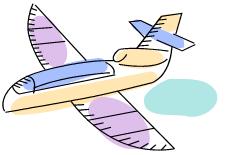Help to Airlines
E.U. Proposes Measures to Help Airlines After Ash
 The European Union on Tuesday warned governments against lavishing emergency aid on airlines to make up for losses from disruptions in operations caused by the eruption of an Icelandic volcano. But it proposed other measures to help them recover from the weeklong shutdown of air travel.
The European Union on Tuesday warned governments against lavishing emergency aid on airlines to make up for losses from disruptions in operations caused by the eruption of an Icelandic volcano. But it proposed other measures to help them recover from the weeklong shutdown of air travel.
The European Commission's own estimate of total losses ranged from €1.5 billion to €2.5 billion, or $2 billion to $3.3 billion, taking into account losses by airlines, airports and tour operators, said Siim Kallas, the E.U. transport commissioner.
The International Air Transport Association last week estimated lost revenue for airlines from the stoppage to be $1.7 billion — but that is before adding in the cost of hotels and meals that airlines have paid for stranded passengers.
Air traffic levels in Europe have been back to normal since Thursday, according to Eurocontrol, the agency responsible for coordinating European air traffic management. According to the agency, more than 100,000 flights were cancelled from April 15 to April 22.
Seeking ways to help airlines without giving one carrier an advantage over others, Mr. Kallas said that airlines should be allowed to expand their use of night flights to ensure that stranded passengers were returned home and backlogs of freight could be delivered.
He also proposed temporarily easing the rules governing the way takeoff and landing slots are allocated at airports.
The European authorities offered the same relief after the terrorist attacks of Sept. 11, 2001, in the United States, when flights were similarly disrupted. The North Atlantic routes especially are hugely important to the profitability of many of Europe’s leading carriers.
Other measures to help airlines with short-term cash-flow problems could include temporarily deferring the so-called en-route charges normally paid by airlines to air traffic control, he said.
But Mr. Kallas also warned E.U governments against doling out excessive amounts of emergency aid to air carriers that already were flailing financially before the crisis. “Any support must respect a level playing field,” he said. Financing “must be granted on basis of uniform criteria,” he added, noting that the competition authorities in Brussels would scrutinize such aid.
The chief of the I.A.T.A., Giovanni Bisignani, has suggested that E.U. governments are directly responsible for the financial losses because they demanded unnecessary airspace closure.
Ordinarily in Europe, airport slots are subject to a rigid application of a use-it-or-lose-it rule. That rule states that if carriers use a takeoff or landing slot less than 80 percent of the time, they must forfeit the slot. Airport slot coordinators calculate slot use on a six-month basis, which means the lost week caused by the ash crisis represented about 4 percent of normal semi-annual use. Airlines have been worried that without any modification to the formula, this would count against them in the way slots are allocated in the second half of this year, said Anthony Concil, a spokesman for the I.A.T.A.
In the United States, most airports set their own slot allocation rules, according to the I.A.T.A. Only three — La Guardia and John F. Kennedy airports in New York and O'Hare in Chicago — apply a use-it-or-lose-it rule similar to Europe.
Mr. Concil noted that many airlines were already using their allocated slots less before the ash cloud shut down air traffic because the economic downturn and financial crisis had reduced demand for air travel.
Before the ash-related shutdowns, European airlines were expected to lose $2.2 billion this year, after a $3.5 billion collective loss in 2009, according to the I.A.T.A.
The industry’s recovery in Europe has been slower than in other parts of the world, like Asia and Latin America, because the slow pace of economic recovery and still-weak consumer confidence.
The I.A.T.A. has also been lobbying hard for government reimbursement of expenses for accommodation and meals that airlines have incurred in compliance with the E.U.’s so-called passenger bill of rights. The rules oblige E.U. carriers — or any airline flying to or from the Union — either to rebook or reimburse air tickets, or foot the bill for passengers’ hotel stays and meals, in the event of cancellations.
"In the immediate situation, we're looking for some relief from the costs incurred for customer care," said Anthony Concil, a spokesman for the I.A.T.A. "Within the parameters of authorized state aid, we are looking to governments to mitigate the aspects of this extraordinary week." But Mr. Kallas cautioned them against expecting too much. "There is not a sack of money waiting somewhere for this kind of crisis," he said, adding that the proposals would be discussed at a meeting of E.U. transport ministers on May 4 in Brussels.
John Hanlon, a spokesman for the European Low Fares Airline Association, welcomed the commission’s acceptance of the industry’s case for compensation. But he expressed concern that the measures might allow governments to offer loans or loan guarantees to traditional carriers that were struggling even before the volcano erupted.
"We are totally for compensation, but it has to be specifically linked to verifiable costs incurred," Mr. Hanlon said. "Loans and guarantees would appear to be the wrong mechanism for that."
The association, whose membership includes Ryanair and easyJet, the leading budget airlines in Europe, has long challenged such support to flag carriers. Last month, it estimated that more than €1 billion worth of state subsidies had been granted in recent years to ailing airlines, including SAS of Sweden, Malev of Hungary, and CSA of the Czech Republic.
Budget carriers are not immune from such accusations, however. Air France recently appealed to the Union to investigate assistance that Ryanair had received from French regional airports.
(Published by The New York Times - April 27, 2010)